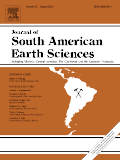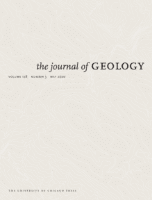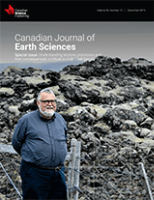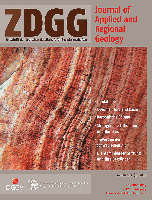
Journal of Earth Science
Scope & Guideline
Connecting global minds through open access geoscience.
Introduction
Aims and Scopes
- Geochronology and Isotope Geochemistry:
The journal frequently publishes research utilizing various geochronological techniques, particularly U-Pb zircon dating, and isotopic analyses to investigate the timing and processes of geological events. - Tectonic and Structural Geology:
A core focus of the journal is the study of tectonic processes and structural geology, examining the evolution of orogenic belts, fault systems, and the implications for regional geological history. - Paleoenvironmental and Paleobiological Studies:
Research on paleoenvironments and the fossil record, including studies of ancient ecosystems and the evolution of life, is a significant area of publication within the journal. - Sedimentology and Stratigraphy:
The journal includes numerous studies on sedimentary processes, stratigraphic frameworks, and the interpretation of depositional environments, which are essential for understanding Earth's geological history. - Natural Hazards and Geohazards:
Research addressing the mechanisms, risks, and mitigation strategies for natural hazards, such as landslides, earthquakes, and floods, is a vital part of the journal's scope. - Hydrogeology and Environmental Geoscience:
The journal covers studies related to groundwater quality, hydrological processes, and environmental impacts, reflecting a commitment to addressing contemporary earth science challenges.
Trending and Emerging
- Climate Change and Environmental Impacts:
Research addressing the impacts of climate change on geological processes and natural hazards, such as landslides and hydrological changes, is increasingly prominent, emphasizing the relevance of earth sciences in understanding climate dynamics. - Machine Learning and Data-Driven Approaches:
There is a growing trend towards utilizing machine learning and data analytics in geosciences, particularly for mineral exploration, hazard assessment, and environmental monitoring, showcasing the integration of technology in earth science research. - Geochemical and Hydrogeological Studies:
Emerging themes include detailed geochemical studies of natural resources and groundwater systems, reflecting an increased focus on sustainable resource management and environmental health. - Geological Hazard Assessment and Mitigation:
Research papers focusing on the assessment and mitigation of geological hazards, particularly in the context of urban development and climate resilience, are gaining prominence, highlighting the practical applications of geoscience.
Declining or Waning
- Historical Geology and Classical Paleontology:
Research focusing on classical paleontological studies and historical geology seems to be waning, with fewer papers being published that delve into traditional fossil studies without a strong interdisciplinary approach. - Geophysical Surveys and Traditional Remote Sensing:
Despite the importance of geophysical methods, there has been a noticeable decrease in studies relying solely on conventional geophysical survey techniques, with a shift towards more integrated approaches involving machine learning and remote sensing. - Mineralogy and Petrology without Geochemical Context:
While mineralogy and petrology remain important, there is a decline in publications that do not incorporate geochemical analyses or broader geological implications, reflecting a trend towards more holistic studies.
Similar Journals

JOURNAL OF SOUTH AMERICAN EARTH SCIENCES
Connecting Past and Present in Earth SciencesJOURNAL OF SOUTH AMERICAN EARTH SCIENCES is a premier interdisciplinary journal dedicated to publishing high-quality research in the fields of Earth-Surface Processes, Geology, and Paleontology, making it an essential resource for scientists and researchers focused on South American geology and its diverse geological phenomena. Published by Pergamon-Elsevier Science Ltd in the United Kingdom, this journal has been instrumental in disseminating groundbreaking studies since 1988, showcasing contributions that push the boundaries of knowledge in Earth and Planetary Sciences. With an impressive Scopus ranking—positioning it in the 74th percentile for Paleontology and 71st for Geology—this journal not only reflects robust academic quality but also its commitment to addressing critical geological challenges in South America. Researchers will appreciate its objective of advancing understanding of geological processes while providing insights into past, present, and future Earth environments. Although available through traditional subscription models, the journal's vast repository of articles enriches the academic landscape, facilitating the sharing of vital research among professionals, students, and geological practitioners.

Journal of the Korean Earth Science Society
Connecting Scholars in Earth Science ExcellenceJournal of the Korean Earth Science Society is a leading peer-reviewed publication dedicated to advancing research in the dynamic field of Earth sciences. Published by the Korean Earth Science Society, this journal serves as a vital platform for disseminating original research, reviews, and significant advancements in areas such as geology, mineralogy, geophysics, and environmental science. With its ISSN 1225-6692 and E-ISSN 2287-4518, the journal is recognized for its commitment to quality and rigor. Although it does not provide open access options at present, it continues to play a crucial role in informing the scholarly community and enhancing the understanding of Earth science phenomena, thus bridging knowledge gaps and fostering collaboration among researchers, professionals, and students alike. For those interested in the latest developments and innovative research findings in Earth sciences, the Journal of the Korean Earth Science Society remains an indispensable resource.

Geosphere
Pioneering Research for a Deeper Understanding of GeologyGeosphere is a premier open access journal published by the Geological Society of America, Inc., dedicated to advancing the fields of geology and stratigraphy. Since its inception in 2005, this journal has established itself as a critical platform for sharing high-quality research, evidenced by its robust positioning in the 2023 Scopus rankings, where it holds the 12th rank in stratigraphy and 75th in geology. With an impressive impact factor and a commitment to open access since 2018, Geosphere facilitates the dissemination of significant findings to a global audience, making it an essential resource for researchers, professionals, and students alike. The journal's scope includes a wide range of topics related to Earth and Planetary Sciences, encouraging interdisciplinary collaboration and innovation. Based in the United States, Geosphere continues to foster a community dedicated to understanding the Earth's processes and resources, ensuring that it remains at the forefront of geological research.

Frontiers of Earth Science
Exploring the Depths of Earth and BeyondFrontiers of Earth Science is a prominent academic journal in the field of Earth and Planetary Sciences, published by Springer. With an ISSN of 2095-0195 and an E-ISSN of 2095-0209, this journal serves as a significant platform for researchers and professionals to disseminate their findings from 2007 to 2024. It is recognized for its impactful contributions within the category of Earth and Planetary Sciences, boasting a respected Q2 ranking in 2023. With a Scopus ranking of 64 out of 195, placing it in the 67th percentile, Frontiers of Earth Science continues to drive academic dialogue and innovation. The journal is dedicated to exploring a diverse range of topics, including geology, meteorology, and environmental science, and amplifying the understanding of Earth systems through rigorous research. Located in New York, USA, this journal embraces an Open Access model, ensuring that groundbreaking research is readily available to the global scientific community, thereby enhancing its accessibility and impact.

JOURNAL OF GEOLOGY
Advancing Knowledge of Earth's Dynamic Processes.The JOURNAL OF GEOLOGY, published by University of Chicago Press, serves as a premier platform for disseminating groundbreaking research in the field of geology. Established in 1973, this esteemed journal has consistently ranked in the Q2 category in geology, further solidified by its Scopus ranking, where it is positioned at 99 out of 321 in Earth and Planetary Sciences, marking it in the 69th percentile of its category. With an emphasis on innovative and interdisciplinary studies, the journal features peer-reviewed articles that contribute to the understanding of geological processes, earth materials, and environmental interactions. Although it does not currently offer open access, it facilitates broad access through academic institutions to reach a global audience of researchers, professionals, and students striving to advance the knowledge of Earth's history and dynamics. As a vital resource for the geology community, the JOURNAL OF GEOLOGY plays an essential role in fostering scholarly dialogue and advancing both academic inquiry and practical applications in geology.

BULLETIN OF GEOSCIENCES
Pioneering Insights in Earth and Planetary SciencesBULLETIN OF GEOSCIENCES, published by the prestigious Czech Geological Survey, stands as a pivotal resource in the fields of Earth and Planetary Sciences and Environmental Science. Since its inception in 2003, the journal has been committed to advancing knowledge through high-quality research, currently holding a commendable Q2 ranking in both disciplines. With its focus on diverse and innovative topics, BULLETIN OF GEOSCIENCES provides an essential platform for researchers, professionals, and students aiming to disseminate and access impactful studies. The journal is indexed in Scopus, ranking #78/195 in General Earth and Planetary Sciences and #110/233 in General Environmental Science, reflecting its significant contribution to academia. Publishing from Prague, Czech Republic, this journal invites contributions that illuminate the interactions between geological processes and environmental phenomena, ensuring an inclusive and accessible approach to crucial global issues.

CANADIAN JOURNAL OF EARTH SCIENCES
Illuminating Geoscience Insights for a Sustainable FutureCanadian Journal of Earth Sciences, published by Canadian Science Publishing, serves as a leading platform for the dissemination of cutting-edge research in the field of Earth and Planetary Sciences. Since its inception in 1968, the journal has contributed significantly to the advancement of knowledge through its rigorous peer-reviewed articles and has established itself within the Q2 category in Earth and Planetary Sciences, reflecting its strong academic reputation and research impact. With an impactful ranking of #87 out of 195 in Scopus, it is positioned within the 55th percentile, showcasing its relevance and quality in the scientific community. The journal caters to a diverse readership ranging from seasoned researchers to emerging scholars, providing vital insights into geoscience disciplines and fostering discussions on significant environmental issues. While it is not an open-access publication, the Canadian Journal of Earth Sciences remains committed to accessible research, ensuring that high-quality findings are shared widely within the Canadian and global scientific communities.

Journal of Asian Earth Sciences-X
Connecting Researchers to Tackle Global Environmental ChallengesJournal of Asian Earth Sciences-X, a distinguished publication by ELSEVIER, is at the forefront of Earth and planetary sciences, particularly focusing on the dynamic fields of geology and earth-surface processes. As an Open Access journal since 2019, it provides unparalleled access to high-quality research, fostering global collaboration and dissemination of knowledge. With an impressive impact factor and ranking in the Q2 category for both Earth-Surface Processes and Geology, it serves as a crucial platform for researchers, professionals, and students alike to share their findings and insights. Situated in the United Kingdom, the journal thrives on contributions that enhance our understanding of Asian geosciences within a broader global context, aiming to tackle major challenges such as climate change and natural resource management. By bridging regional studies with global perspectives, the Journal of Asian Earth Sciences-X is not only a vital resource for academia but also supports sustainable development initiatives across the region.

GEOSCIENCES JOURNAL
Advancing Knowledge in Earth and Planetary Sciences.Welcome to the GEOSCIENCES JOURNAL, a pivotal publication in the fields of Earth and Planetary Sciences and Environmental Science, proudly presented by the Geological Society of Korea. Established in 1997, this journal has become a prominent platform for researchers, professionals, and students, offering a rich collection of peer-reviewed articles that explore a diverse array of geoscientific topics. With an impressive Q2 ranking in both Earth and Planetary Sciences and Environmental Science categories for 2023, it stands as an essential resource in the academic community. Though it operates under a traditional subscription model, GEOSCIENCES JOURNAL remains dedicated to advancing knowledge through rigorous research. Addressed from its headquarters in Seoul, South Korea, the journal aims to foster a deeper understanding of geosciences, encouraging innovation and collaboration in tackling today’s environmental challenges.

Zeitschrift der Deutschen Gesellschaft fur Geowissenschaften
Connecting Scholars: Insights into Planetary Science and EnvironmentZeitschrift der Deutschen Gesellschaft für Geowissenschaften is a prominent academic journal published by E Schweizerbart’sche Verlagsbuchhandlung, dedicated to advancing research in the field of Earth and Planetary Sciences. With its ISSN 1860-1804 and E-ISSN 1861-4094, this journal provides a platform for researchers to disseminate high-quality scientific articles and insights that contribute to our understanding of geological and environmental phenomena. Over the years, it has established itself as a reputable source within its category, holding a Q3 ranking among the Earth and Planetary Sciences (miscellaneous) journals in 2023, and achieving an impressive 85/195 rank in Scopus, placing it in the 56th percentile. The journal is published from Germany, specifically at Johannesstraße 3A, D 70176 Stuttgart, where it fosters a collaborative environment for scholars, professionals, and students alike. Although currently not an Open Access journal, it offers critical insights into various geoscience topics, making it an essential resource for those engaged in geological research and education. With its converged years stretching from 2008 to 2024, Zeitschrift der Deutschen Gesellschaft für Geowissenschaften is poised to continue its impactful role in the geosciences community.